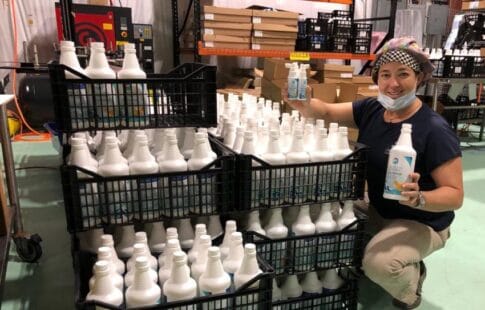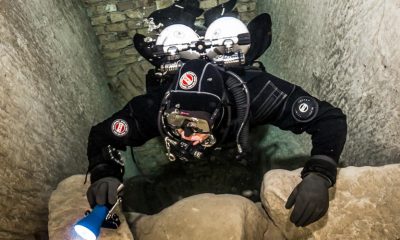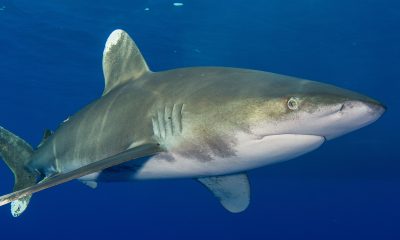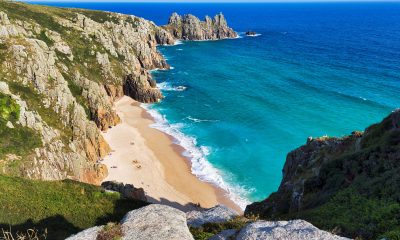Marine Life & Conservation
Stream2Sea Founder Autumn Blum creates eco-conscious hand sanitizer and saves her company amidst COVID-19

Is your sanitizer reef safe?
As hand sanitizers become a part of our daily lives, Stream2Sea CEO and avid diver Autumn Blum says it’s time to take a hard look at the products on the market.
“When it all started, we were just happy to find sanitizers on store shelves so many of us didn’t take the time to read the ingredients,” she says. “If you look carefully though, some of those ingredients are pretty scary – for our coral reefs and for our own bodies.”
At the height of the pandemic, the government lifted restrictions and eased barriers for manufacturers to help reduce the shortage, but that inadvertently encouraged a flood of sub-standard products.
Even beyond the recall of sanitizers containing methanol, many commercial hand sanitizers are using ingredients that aren’t safe for people or the environment.
Microplastics in Sanitizers
Although microplastic beads have been banned from toothpastes and body lotions, many cosmetics still contain hidden microplastics. And hand sanitizer is no exception to that. More than 97% of the sanitizer gels on the market today contain ingredients commonly considered to be microplastics. These include acrylates copolymer and carbomer.
True to Stream2Sea’s planet-friendly mission, both sanitizer formulas are 100% natural, plant based and microplastic free.
All Alcohol Isn’t Created Equally
“Sanitizers are usually made with commercially denatured alcohol, which is just ethanol mixed with a substance that makes it unsuitable for human consumption and less likely to be consumed recreationally,” Blum said. “The most common alcohol being used for sanitizer is called SDA 40-B ethanol. It contains denatonium benzoate and tert-butanol, denaturants that are often not listed on product labels. After reading the SDS (safety data sheets) on these ingredients, I would never use them in our formulas, or intentionally put them on my body or near our waters.”
Among other warnings, the data sheets clearly state:
- May cause central nervous system depression.
- May be absorbed through the skin.
- Causes serious eye damage.
- Fatal if inhaled.
- Material may be irritating to the mucous membranes and upper respiratory tract.
Reading Labels Doesn’t Always Count
The FDA specifically includes the use of tert-butanol as a denaturant without requiring that it is listed on the label in a temporary policy implemented while hand sanitizers were in short stock. This goes against the standard policy for hand sanitizers, which are regulated as OTC drugs and typically require all ingredients be listed.
With its headquarters in Florida, Stream2Sea was able to secure locally produced ethanol made from distilled orange peels or sugarcane waste. Rather than chemical denaturants, Stream2Sea sanitizers are made ‘unedible’ using natural camphor and eucalyptus essential oils, both of which are traditionally used in herbal medicine. Rather than using propylene glycol – an ingredient found in both antifreeze and commercial sanitizers – as a moisturizer, Stream2Sea uses vegetarian glycerin and Vitamin E. The formula is extraordinarily effective as well. Challenge tests require sanitizers kill 99.99% of germs within 60 seconds; this was shown to be clinically effective in less than 15 seconds.
Keeping It Real: The Challenge of Selling Sanitizer During a Pandemic
A Crash Course for Blum
Learning the ins and outs of manufacturing sanitizer was a crash course for Blum, an award-winning cosmetic chemist who started Stream2Sea to make reef-safe sunscreens and body care products. “One day we were gearing up for a busy beach and cruise season, the next day we were pretty much shut down,” she said.
With a dozen employees and an idle FDA-registered manufacturing facility, making hand sanitizer was the answer to keeping her company going as the pandemic shut down many businesses.
“We’re all making compromises through this crisis but, as divers and as a nation, we need to be aware of the ingredients we are purchasing, so we know exactly what we’re putting on our bodies and spreading across our planet.
As our world and our dive centers gets back to business, “We look forward to continuing to educate divers about reef safe sunscreen and body care ingredients, and will now include sanitizers and microplastics in trainings.”
Source: www.divenewswire.com
Marine Life & Conservation
Leading UK-based shark conservation charity, the Shark Trust, is delighted to announce tour operator Diverse Travel as a Corporate Patron

 Corporate Patrons provide a valuable boost to the work of The Shark Trust. The Trust team works globally to safeguard the future of sharks, and their close cousins, the skates and rays, engaging with a global network of scientists, policymakers, conservation professionals, businesses and supporters to further shark conservation.
Corporate Patrons provide a valuable boost to the work of The Shark Trust. The Trust team works globally to safeguard the future of sharks, and their close cousins, the skates and rays, engaging with a global network of scientists, policymakers, conservation professionals, businesses and supporters to further shark conservation.
Specialist tour operator Diverse Travel has operated since 2014 and is committed to offering its guests high quality, sustainable scuba diving holidays worldwide. Working together with the Shark Trust will enable both organisations to widen engagement and encourage divers and snorkellers to actively get involved in shark conservation.
“Sharks are truly at the heart of every diver and at Diverse Travel, we absolutely share that passion. There is nothing like seeing a shark in the wild – it’s a moment that stays with you forever!” says Holly Bredin, Sales & Marketing Manager, Diverse Travel.
“We’re delighted to celebrate our 10th year of business by becoming a Corporate Patron of the Shark Trust. This is an exciting partnership for Diverse and our guests. We will be donating on behalf of every person who books a holiday with us to contribute towards their vital shark conservation initiatives around the world. We will also be working together with the Trust to inspire divers, snorkellers and other travellers to take an active role – at home and abroad – in citizen science projects and other activities.”
Paul Cox, CEO of The Shark Trust, said:
“It’s an exciting partnership and we’re thrilled to be working with Diverse Travel to enable more divers and travellers to get involved with sharks and shark conservation. Sharks face considerable conservation challenges but, through collaboration and collective action, we can secure a brighter future for sharks and their ocean home. This new partnership takes us one more valuable step towards that goal.”
For more information about the Shark Trust visit their website here.
For more about Diverse Travel click here.
Marine Life & Conservation
Shark Trust Asks Divers to help with Shark Sightings this Global Citizen Science Month

 Whether you are stuck for ideas of what to do with the kids or are off on the dive trip of your dreams. You can get involved in Citizen Science Month and help the Shark Trust by providing vital data about sharks are rays both close to home and further afield.
Whether you are stuck for ideas of what to do with the kids or are off on the dive trip of your dreams. You can get involved in Citizen Science Month and help the Shark Trust by providing vital data about sharks are rays both close to home and further afield.
In addition to reporting the sharks and rays you see on your dives, the eggcases you find on the beach, the Shark Trust is looking for some specific data from divers who are asked to report any Oceanic Whitetip and Basking Sharks.
Oceanic Whitetip Sharks
The Shark Trust are looking specifically for Oceanic Whitetip Shark sightings over the coming weeks and months. So, if you are diving anywhere in the world, please report your sightings via the website or app.
Website: https://recording.sharktrust.org/
App: Search The Shark Trust in your app store
The Oceanic Whitetip. Known for their incredibly long dorsal and pectoral fins, this species was once the most abundant oceanic-pelagic species of shark on the planet.
Large and stocky, they are grey or brown above, and white below and famous for their huge rounded first dorsal fin and paddle-like pectoral fins. The fins also highly prized within the shark fin trade. Whilst they are mostly solitary, Oceanic Whitetips do occasionally hunt in groups.
An inquisitive species, they were easy prey for fisheries. Combined with their low reproductive rate, they were inevitably at high risk of population depletion. And declines of up to 99% have been reported in certain sea areas. They are listed as Critically Endangered on the IUCN Redlist (2019).
Conservation efforts to discourage further declines include listing on CITES Appendix II and CMS Appendix I. They’re also the only species prohibited from take by all the Tuna RFMOs (Regional Fisheries Management Organisations). However, these measures do not mean that Oceanic Whitetips are not still caught – whether targeted or as bycatch – in some parts of the world. With populations declining at such a high rate, effective implementation of management measures is essential to ensure that the species can recover.
If you are lucky enough to get an image of an Oceanic Whitetip and you record your sighting on the Shark Trust app or website YOU CAN WIN! All images submitted with sightings, that also give consent to use in conservation messaging, will be in with a chance to win an Oceanic Whitetip T-shirt and mug. The competition will run until the end of “Shark Month” in July – so keep those sightings (and images) coming in.
Basking Sharks
Basking Shark (Cetorhinus maximus) season is upon us, and the Shark Trust is asking everyone to keep an eye out for these majestic giants over the summer months. If you see any, you can record your sighting to the Basking Shark Sightings database.
Each year, these mighty fish return to British waters to feed on plankton. You may see one, (or a few if you’re really lucky) from around April-October. They can be seen feeding at the surface of the water, where they look like they’re basking in the sun. Thus, their name!
Sighting hotspots around the British Isles include southwest England, Isle of Man, north coast of Ireland, and western Scotland. The Sea of the Hebrides is the most prolific sightings area in Scotland, but they have been spotted all around the coast and have even ventured into some of the sea lochs. The Shark Trust has received thousands of sightings since the Basking Shark project began, but more data is needed to truly understand what is going on with population numbers and distribution. You can help by recording your sightings this summer.
Great Eggcase Hunt
The Shark Trust has an Easter Egg Hunt with a difference for you to try. Take part in the Great Eggcase Hunt and get involved with a big citizen science project that helps shark, ray and skate conservation. And it’s an enjoyable activity for all the family.
The Shark Trust also want snorkellers and divers to record their underwater eggcase findings. Underwater records help pinpoint exactly where sharks and skates are laying their eggs and can help link to beach records. Learning the depth and substrate that they lay on also helps better understand the species.
Find out more: https://www.sharktrust.org/great-eggcase-hunt
Whether you are diving, snorkelling or exploring on the beach you can take part in Citizen Science Month and get actively involved in shark and ray conservation. Find out more: www.sharktrust.org
-

 News3 months ago
News3 months agoHone your underwater photography skills with Alphamarine Photography at Red Sea Diving Safari in March
-

 News2 months ago
News2 months agoCapturing Critters in Lembeh Underwater Photography Workshop 2024: Event Roundup
-

 Marine Life & Conservation Blogs2 months ago
Marine Life & Conservation Blogs2 months agoCreature Feature: Swell Sharks
-

 Blogs2 months ago
Blogs2 months agoMurex Resorts: Passport to Paradise!
-

 Blogs2 months ago
Blogs2 months agoDiver Discovering Whale Skeletons Beneath Ice Judged World’s Best Underwater Photograph
-

 Gear News3 months ago
Gear News3 months agoBare X-Mission Drysuit: Ideal for Both Technical and Recreational Divers
-

 Gear Reviews2 months ago
Gear Reviews2 months agoGear Review: Oceanic+ Dive Housing for iPhone
-

 Marine Life & Conservation2 months ago
Marine Life & Conservation2 months agoSave the Manatee Club launches brand new webcams at Silver Springs State Park, Florida



















